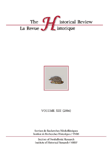
Historical Review-La Revue Historique
Scope & Guideline
Fostering Inquiry into Our Shared Past.
Introduction
Aims and Scopes
- Greek Environmental History:
The journal emphasizes the intersection of environmental factors and historical developments in Greece, exploring how geographical and ecological contexts have shaped historical narratives. - Ottoman Influence and Legacy:
A significant area of focus is the Ottoman Empire's impact on Greek history, including cultural, political, and social transformations during and after the Ottoman rule. - Modern Greek National Identity:
The journal investigates themes related to the formation of Greek national identity, particularly during the 19th and 20th centuries, including the Greek War of Independence and subsequent socio-political developments. - Interdisciplinary Historical Narratives:
It encourages interdisciplinary studies that connect history with literature, art, and philosophy, fostering a broader understanding of historical events and their implications. - Public and Political Discourse:
The journal examines how historical events are represented and contested in public discourse, including the roles of institutions, the media, and academic narratives.
Trending and Emerging
- Environmental History:
There is a noticeable increase in the exploration of environmental history, emphasizing the relationship between conflict, politics, and ecological changes, particularly in the context of Greece's historical landscape. - Digital Humanities and Historical Mapping:
The rise of digital tools for historical research, such as digital atlases, indicates a growing interest in utilizing technology to enhance the understanding of historical events and geographies. - Cultural and Intellectual History:
Recent papers reflect a trend towards examining cultural narratives and intellectual movements, particularly in relation to nationalism and identity formation in Greece. - Health and Society:
Emerging themes related to health, psychiatry, and societal perceptions indicate a growing interest in how these aspects have influenced historical narratives and public discourse. - The Role of Women in History:
There is an increasing focus on women's roles and experiences throughout Greek history, suggesting a shift towards more inclusive historical narratives that explore gender dynamics.
Declining or Waning
- Early Modern Political History:
Themes related to early modern political structures and events have seen less frequent exploration, possibly overshadowed by a focus on more contemporary issues and narratives. - Classical Antiquity Studies:
There seems to be a waning interest in classical antiquity as a standalone focus, with fewer papers dedicated to this period compared to emerging themes that integrate classical studies with modern contexts. - Regional History of Minorities:
Explorations of minority histories within Greece or the Ottoman Empire have become less prevalent, indicating a shift towards more mainstream narratives that center on the dominant national history.
Similar Journals

Casopis za Suvremenu Povijest
Illuminating Croatia's Historical LandscapeCasopis za Suvremenu Povijest, published by the reputable HRVATSKI INST POVIJEST, is a pivotal journal in the field of contemporary history, particularly significant to scholars focused on Croatian and broader Eastern European historical narratives. With an ISSN of 0590-9597 and an E-ISSN of 1848-9079, this journal has established its standing as a Q2 ranked publication within its discipline, showcasing its high-quality research contributions as reflected in its 68th percentile rank among its peers in Scopus. Operating without an open access model, the journal offers a wealth of scholarly articles that discuss intricate historical themes and dynamics, making it an essential resource for researchers, professionals, and students who aim to deepen their understanding of contemporary historical issues. From its operational years starting in 2001 and converging from 2013 to 2023, the journal continues to serve as a vital forum for innovative historical research and discourse in Croatia and beyond.

Istorija
Fostering Dialogue Through Historical InsightIstorija is a distinguished academic journal published by Vytautas Magnus University Education Academy, focusing on historical research and discourse. With its ISSN 1392-0456 and E-ISSN 2029-7181, the journal aims to disseminate high-quality scholarly articles that explore various facets of history, catering to an audience of researchers, educators, and students alike. Although currently not open access, Istorija remains committed to advancing historical scholarship by contributing valuable insights and fostering academic dialogue through an inclusive editorial process. Set against the backdrop of Vilnius, Lithuania, the journal engages with both regional and international historical narratives, making it a pivotal resource for those looking to deepen their understanding of historical events, methodologies, and interpretations. Whether you are a seasoned historian or a burgeoning scholar, Istorija offers a platform for the exploration and exchange of innovative ideas and research within the discipline.

Skhidnoievropeiskyi Istorychnyi Visnyk-East European Historical Bulletin
Unveiling the Rich Tapestry of the PastSkhidnoievropeiskyi Istorychnyi Visnyk-East European Historical Bulletin is a prominent academic journal published by Ivan Franko Drohobych State Pedagogical University, dedicated to the rigorous study and dissemination of historical knowledge in Eastern Europe. With an ISSN of 2519-058X, this Open Access journal has been serving the academic community since 2016, providing a platform for researchers, professionals, and students to share innovative findings and analyses. The journal is positioned within key academic categories, securing a rank of #704 in Arts and Humanities History and #222 in Arts and Humanities Archaeology according to Scopus, thereby reflecting its significance and impact within the field. The Skhidnoievropeiskyi Istorychnyi Visnyk invites contributions that expand upon the understanding of Eastern European history while fostering interdisciplinary dialogue, making it an invaluable resource for anyone engaged in historical scholarship.
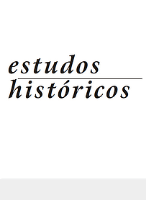
Estudos Historicos
Bridging Disciplines: A Gateway to Historical Understanding.Estudos Historicos, an esteemed academic journal published by FUNDACAO GETULIO VARGAS-FGV, is a pivotal platform for scholars in the fields of History, Cultural Studies, and Literature. With a focus on contemporary historical discourse and interdisciplinary approaches, this Open Access journal has been fostering scholarly dialogue since 2009, ensuring that vital research is accessible to a global audience. Based in Brazil, it holds impressive rankings, notably within the top tier of the Scopus database, where it is positioned in the 88th percentile for Literature and Literary Theory and the 75th percentile for History. The journal also boasts a Q1 categorization in Literature and Literary Theory, reflecting its commitment to high-quality scholarship. With its comprehensive scope, Estudos Historicos plays a crucial role in shaping the understanding of historical contexts and cultural narratives, appealing to researchers, professionals, and students alike who seek to explore the intersections of history, society, and literature.
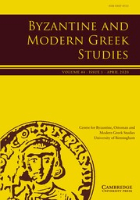
BYZANTINE AND MODERN GREEK STUDIES
Discovering the Intersections of Language and LiteratureBYZANTINE AND MODERN GREEK STUDIES, published by Cambridge University Press, is a premier journal dedicated to the exploration of Byzantine and modern Greek history, literature, culture, and linguistics. With an ISSN of 0307-0131 and an E-ISSN of 1749-625X, the journal has established itself as a significant contribution to the field since its inception in 1975, with converged publication years extending to 2024. It currently holds a commendable ranking in various categories, including Q2 in Cultural Studies and History, as well as Q1 in Literature and Literary Theory, reflecting its academic rigor and impact. Researchers and scholars can access a wealth of knowledge that highlights the intricate connections between Byzantine heritage and modern Greek identity, all while benefiting from the journal's high visibility in indexes such as Scopus, which ranks it favorably within the top percentiles of related fields. The journal's commitment to fostering interdisciplinary dialogue makes it an invaluable resource for those seeking to deepen their understanding and appreciation of Greece's historical and cultural narrative.
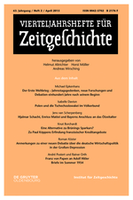
VIERTELJAHRSHEFTE FUR ZEITGESCHICHTE
Illuminating Today's Socio-Political Landscape through HistoryVIERTELJAHRSHEFTE FUR ZEITGESCHICHTE, published by WALTER DE GRUYTER GMBH, is a leading journal in the field of History, dedicated to exploring contemporary historical issues with a critical perspective. Established in 1967, this esteemed publication has significantly contributed to historical scholarship and is indexed in Scopus, holding an impressive rank of #575 out of 1,760 in Arts and Humanities, with a 67th percentile ranking, reflecting its academic rigor and impact. The journal operates under a non-open access model, ensuring comprehensive editorial standards and peer-reviewed content. With its headquarters in Berlin, Germany, the journal focuses on a wide range of interdisciplinary topics, fostering discussions that are relevant in today's socio-political context. Scholars, students, and practitioners alike value the journal for its insightful analyses and extensive coverage of the historical narrative from 1976 to 2024, making VIERTELJAHRSHEFTE FUR ZEITGESCHICHTE an essential resource for anyone engaged in the study of modern history.

Scandia
Illuminating the Past with Rigorous InquiryScandia is a distinguished academic journal dedicated to the field of history, published by SCANDIA in Sweden. With its origins dating back to 1976, the journal offers a platform for scholarly discourse, focusing on various historical perspectives and methodologies. Although currently not recognized as an Open Access journal, it fosters a rich exchange of ideas and original research, appealing to historians, researchers, and students alike. Operating within the Q4 quartile of its category for 2023, Scandia holds a significant position in the history landscape, ranking at #1627 out of 1760 in Scopus, representing the 7th percentile. With a commitment to quality scholarship, Scandia encourages contributions that challenge existing narratives and contribute to the broader understanding of historical contexts.
Please send your submissions or inquiries to the editorial office at Historiska Inst, Box 2074, Lund 220 02, Sweden.

Osmanli Arastirmalari-The Journal of Ottoman Studies
Celebrating the Depth and Diversity of Ottoman StudiesOsmanli Arastirmalari-The Journal of Ottoman Studies, published by ISTANBUL 29 MAYIS UNIV & ISAM, is a premier academic journal focusing on the multifaceted history and cultural studies of the Ottoman Empire and its enduring legacy. With a commitment to advancing scholarly discourse, this journal has successfully established itself within the cultural studies and history fields, evidenced by its current ranking in the Q3 quartile for both categories in 2023. The journal is dedicated to providing a platform for researchers, professionals, and students to disseminate original research findings spanning various disciplines related to Ottoman studies. As a crucial resource for informed analyses and interpretations of historical contexts, it invites contributions that explore the complexities of Ottoman society, politics, and culture from 2015 to 2022. Although it currently does not offer Open Access, the journal's impact on the field remains significant, fostering a deeper understanding of historical narratives that continue to shape modern cultural identities.

Memoria y Civilizacion-Anuario de Historia
Fostering Critical Conversations in the HumanitiesMemoria y Civilizacion-Anuario de Historia, published by UNIV NAVARRA, SERVICIO PUBLICACIONES, is a prestigious open-access journal that has been serving the academic community since 1998. With a focus on historical research, this journal contributes significantly to the field by offering a platform for scholars to disseminate their findings and engage in critical discussions. With its Q1 ranking in History for 2023 and a solid position in the Scopus listings (Rank #905/1760), it underscores its importance in the humanities, ensuring that quality research reaches a wide audience. The journal is based in Spain and is committed to open access, providing free availability of its content to promote wider dissemination of knowledge. Researchers, professionals, and students alike will find Memoria y Civilizacion-Anuario de Historia to be an indispensable resource for historical inquiry and scholarship.
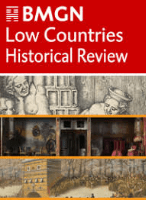
BMGN-The Low Countries Historical Review
Navigating the Intricacies of Low Countries HistoryBMGN-The Low Countries Historical Review, published by the KONINKLIJK NEDERLANDS HISTORISCH GENOOTSCHAP, is a distinguished open-access journal dedicated to the study of the history of the Low Countries, offering insights and diverse perspectives on historical developments from the region. With an ISSN of 0165-0505 and an E-ISSN of 2211-2898, this journal has been a valuable resource since its inception in 1970, with its rich archive covering pivotal years including 1975 and periods from 1999 to 2002, as well as the continuous series since 2009. With a notable impact factor supporting its reputation—scoring a commendable Q3 in History and achieving the 85th percentile rank within the Arts and Humanities category—BMGN is instrumental in fostering scholarly dialogue and advancing historical discourse. The journal's open-access format ensures broad access to its content, supporting researchers, professionals, and students keen to explore the intricate tapestry of Low Countries history. With its office located in The Hague, Netherlands, BMGN continues to be a pivotal forum for historical engagement and publication.